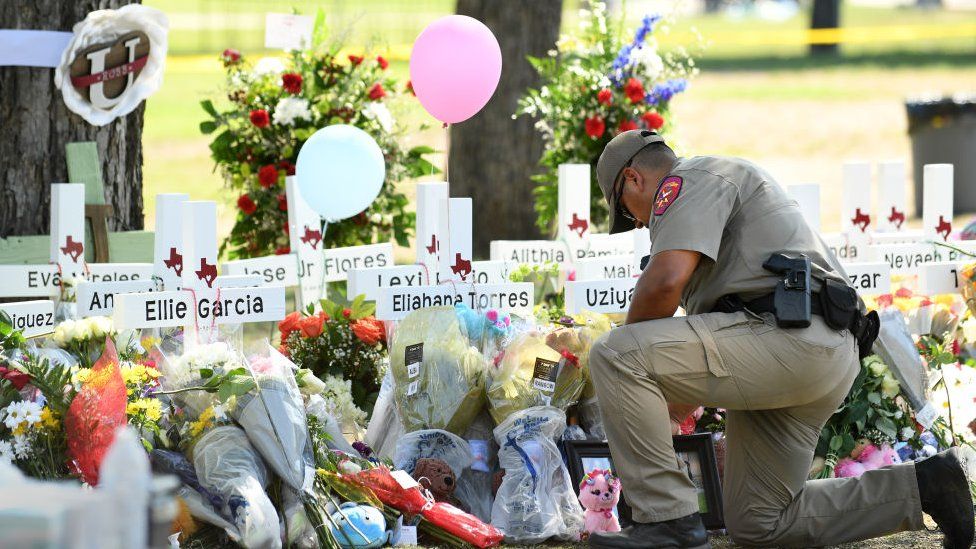Texas shooting: US gun control claims fact-checked
- Published

The issue of controls on gun ownership is being debated in the United States once again, after a gunman opened fire in a school in Uvalde, Texas, killing 19 children and two teachers.
US politicians, including President Joe Biden, have been making claims about gun rights.
Cruz: "It [restricting gun rights] doesn't work, it's not effective."
Following the shooting, Ted Cruz, a Republican senator from Texas who has opposed Democrat gun control measures, made this claim, without specifying whether he was talking about restricting rights in the US or in other countries.
Texas Governor Greg Abbott, who has also opposed gun control measures, did specify, and pointed to Chicago, Illinois.
Illinois has stricter gun laws than Texas but experiences a higher rate of gun crime, especially in the city of Chicago.
However, the majority of guns recovered in Chicago come from other states, often with looser gun laws, such as Indiana and Mississippi.
A 2017 Chicago police department report revealed that almost 60% of the illegal guns used in crimes in the city came from outside the state.
Overall, states with stronger gun laws have lower gun death rates, according to research by the Giffords Law Center, a gun control advocacy group.
"State laws can be effective but they are not completely - each state can put restrictions in place but it's very easy to drive across state lines with illegal products. You're not getting checked at the border," says David Pucino of Giffords.
In the US, each state can make its own criminal laws. For the same law to apply in every state though, it has to be passed at a federal level, and there has been limited success passing gun laws this way.
When it comes to international comparisons, there are several countries which have experienced a reduction in gun crime after nationwide restrictions were introduced following mass shootings.
In Australia following the Port Arthur massacre in 1996, significant gun controls were introduced.
The National Firearms Agreement prohibited almost all automatic and semi-automatic rifles, made gun registration compulsory, and set up a gun "buyback programme".
Following this, gun-related death rates and gun-related mass killings declined significantly.
In the UK, the list of banned weapons was expanded following the Hungerford mass shooting in 1987, and further gun restrictions were introduced after the Dunblane school shooting in 1996.
There have been two mass shooting in the UK following Dunblane, and although gun crime did rise in England and Wales after 1996, it peaked in 2004 and has declined since, which analysts say is as a result of better enforcement.
Switzerland and Finland have some of the highest rates of gun ownership in Europe, with strong hunting cultures, but they both have strict rules in place such as gun registration. Both countries have very few gun-related homicides.
A look at 130 studies from over 10 countries found that restrictions on guns tended to be followed by a decline in gun deaths.
Biden: "The Second Amendment isn't absolute. When it was passed you couldn't own a cannon."
President Biden made two claims here about the Second Amendment, which was passed in 1791 to protect Americans' right to bear arms and is often cited by opponents of gun controls.
The amendment states: "A well regulated militia, being necessary to the security of a free state, the right of the people to keep and bear arms, shall not be infringed."
President Biden's assertion that the amendment is not "absolute" is backed up by a ruling by the US Supreme Court in 2008.
It stated: "It is not a right to keep and carry any weapon whatsoever in any manner whatsoever and for whatever purpose."
But he is wrong to say that people were banned from owning a cannon when the amendment was passed.
"He's made this claim a number of times and it's false, there were no laws banning a cannon when the Second Amendment was ratified," says Josh Blackman, a constitutional law expert at the South Texas College of Law.
Abbott: "We as a state, we as a society, need to do a better job with mental health."
Greg Abbott, the Republican Governor of Texas, said the gunman who opened fire at the school had "a mental health challenge" and said the state needed to do "better" on mental health.
But in April 2022, he diverted more than $200m (£160m) of funding away from the Health and Human Services Commission, which is in charge of the state's mental health programmes.
The Texas Tribune reported these funds went towards border security efforts.
Texas ranks last among US states for overall access to mental health care, according to the 2022 State of Mental Health in America report.
Correction 30 May: An earlier version of this piece stated there had been one mass shooting in the UK following Dunblane. There have been two, based on the definition widely used in the US of four or more deaths.